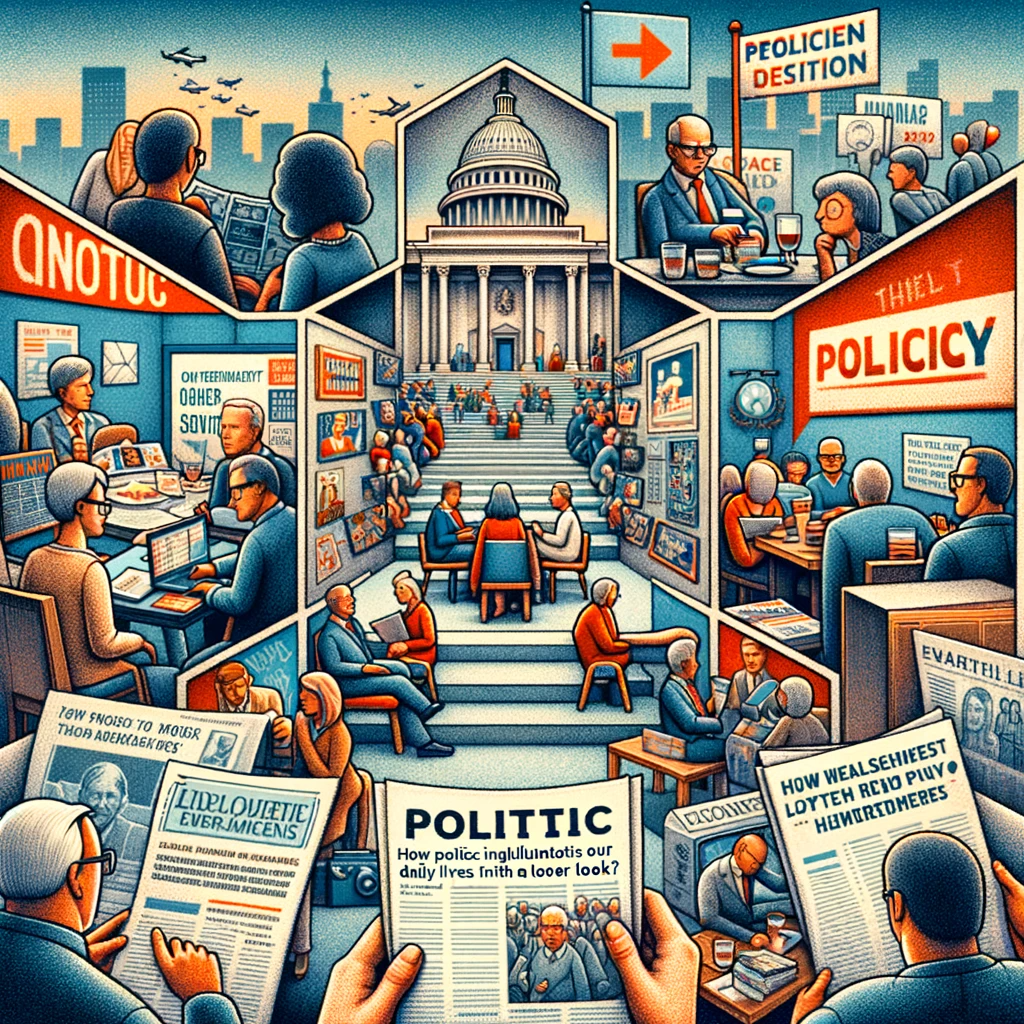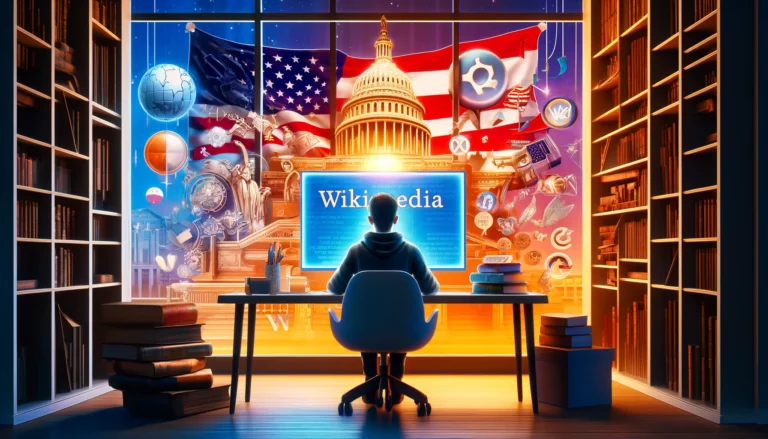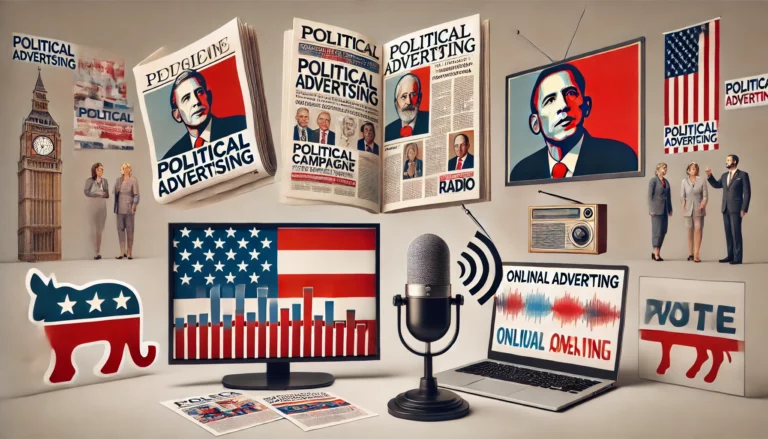How Politics Influence Our Daily Lives: A Closer Look
The Pervasive Power of Government Decisions in Our Everyday Activities
The realm of politics, often viewed as an abstract or distant concept, plays a substantial role in our daily lives. Whether we recognize it or not, political decisions shape the society we live in and influence our everyday activities. From the food we eat to the schools we attend, and even to the air quality around us, everything is impacted by governmental policies. In terms of food safety and quality, governmental regulations are indispensable. Politics determine how our food is produced, processed, and sold. For instance, policies related to agricultural subsidies can directly affect the cost and availability of certain foods. The government also establishes health standards that regulate ingredients used in processed foods and mandates labeling requirements to inform consumers about what they’re eating. Moreover, regulations control the use of potentially harmful substances like pesticides or antibiotics in farming. Thus, every time we go grocery shopping or dine out at a restaurant, we’re interacting with political decisions. Similarly, education is another domain significantly influenced by politics. Public schools are funded and operated mainly through government bodies at various levels including local school boards, state departments of education, and federal agencies. Political decisions drive curriculum standards which dictate what subjects are taught and how they’re presented to students. Additionally, policies also determine teacher qualifications and student testing methods among other things. So although it may not seem apparent at first glance—every parent sending their child off to school each morning is entrusting a political system with their child’s education.

Unseen Impact: How Legislation Shapes Our Daily Routine
The influence of politics on our daily lives is not always immediately evident, yet it’s nonetheless pervasive. Consider, for instance, the legislation regarding our roads and public transportation. The quality of roads we drive on, the availability of bike lanes for cyclists, and the efficiency of public transport are all determined by political decisions. Government policies dictate how funds are allocated towards infrastructural developments like road repair or expansion of subway lines. Hence, every time you commute to work or take a leisurely drive, you’re navigating a landscape sculpted by politics. Furthermore, environmental regulations have direct implications on our living conditions. Policies related to air and water quality shape the environment we live in and impact our health in subtle but significant ways. Legislation dictates permissible levels of pollutants in our atmosphere and bodies of water which can affect everything from asthma rates to the safety of our drinking water. If you’ve ever enjoyed a clean breath of air at a city park or trusted that your tap water is safe to drink – that too is courtesy of governmental regulations. In addition, even aspects as personal as our leisure activities can be influenced by politics. For example, local governmental policies decide how public spaces like parks and recreation centers are maintained or developed. Federal laws regulate hunting seasons and fishing licenses while state laws may determine where you can camp or hike. Therefore, when we engage in these recreational activities, we’re participating in an arena defined by political choices made on our behalf. It may come across as unnoticeable at first glance; however, its effect is very much present in every path we tread during a morning jog or each camping trip with friends.
Understanding the Influence of Public Policies on Personal Finances
Public policies have a significant impact on our personal finances, though we may not always be conscious of this influence. For starters, consider how tax policies affect your income. The government determines the rate at which you’re taxed and these policies directly influence the amount of money you take home every month. This is not limited to income tax alone but includes property taxes, sales taxes, and other levies as well. Essentially, every time you receive a paycheck or make a purchase at your local grocery store, political decisions are impacting your financial situation. Next, let’s think about social security and welfare programs. These schemes are meant to provide financial safety nets for citizens during times of hardship or upon reaching retirement age. However, the nature and extent of these benefits vary significantly depending on the political climate and policy decisions taken by those in power. So if you’re relying on such programs for your future security or current sustenance, politics plays a crucial role in determining their efficacy. Lastly, public policies can also shape our personal finances through economic regulations. These rules govern everything from interest rates on loans to price controls on essential goods and services. They can directly affect your savings plans or even dictate how much you pay for necessities like food and housing. Hence, whether you’re saving up for a dream house or managing day-to-day expenses, it’s important to understand that these aspects of your financial life do not exist in a vacuum but are greatly influenced by larger political dynamics at play.
Scrutinizing the Effects of International Relations on Local Communities
International relations, often considered a high-level political arena, have profound influences on local communities. Decisions made in the global political sphere can shape the economic, social, and cultural aspects of our everyday lives. This is primarily due to globalization, which has allowed countries to be more interconnected than ever before. As a result, a policy change or conflict in one country can have ripple effects that impact communities thousands of miles away. One of the most significant ways international relations impact local communities is through trade policies. Global trade agreements dictate what goods and services we can access and at what cost. For instance, if tariffs are imposed on certain imports, it could lead to an increase in prices for those items in your local stores. Conversely, free trade agreements could lower costs and increase availability of foreign products. Moreover, these policies also affect local job markets since industries tied to international trade could either boom or shrink based on these decisions. Another aspect lies in how international politics influence immigration policies. These decisions can directly shape the demographic make-up of our neighborhoods and cities. Policies that encourage immigration can bring about cultural diversity and economic benefits as new residents contribute their skills and resources to the community. On the other hand, restrictive immigration policies may limit this influx leading to a less diverse community both culturally and economically. Thus, being attuned to developments in international relations isn’t just for politicians or diplomats – it’s important for everyone because these dynamics directly mold our local environment. Whether it’s affecting the price tag on your favorite fruit or who your next-door neighbor might be – choices made on the global stage have tangible implications right at your doorstep. So while these processes might seem distant or abstract, remember: they’re closer to home than you think.
Education and State Policy: The Ties That Bind
One cannot discuss the influence of politics on our daily lives without delving into the role of state policies in education. These policies, which govern everything from curriculum standards to teacher qualifications and funding allocations, have a profound impact on what and how students learn. Firstly, consider the curriculum standards set by state governments. These standards dictate what subjects are taught in schools, what specific content is covered within each subject, and at what grade level these topics are introduced. For instance, if your state’s policy emphasizes STEM (Science, Technology, Engineering and Mathematics) education over humanities, this will shape not only what your child learns but also potentially their future career path. As such, decisions made at the legislative level directly affect our children’s classrooms and future opportunities. Secondly, let’s examine teacher recruitment and qualifications – areas also heavily influenced by state politics. The requirements set for acquiring a teaching license vary significantly from one state to another. Policies about teacher pay scales can determine whether talented educators stay in the profession or leave for higher-paying jobs elsewhere. The ripple effect of these policies is felt in our classrooms as they contribute to the quality of instruction that students receive. Lastly, state policies play a critical role in determining how funds are allocated across school districts. This has direct implications on resource availability from textbooks to technology and extracurricular programs offered at schools. A well-funded school often translates into better educational outcomes for students while underfunded schools struggle to provide necessary resources leading to an achievement gap among students. So while it might be easy to overlook these administrative details buried deep within policy documents as distant bureaucratic procedures, remember that they shape our children’s day-to-day learning environment profoundly. Politics plays an instrumental role in molding our nation’s future – one classroom at a time!
The Role of Healthcare Laws in Shaping Individual Health Choices
When we talk about the influence of politics on our daily lives, we cannot ignore the significant impact of healthcare laws on our individual health choices. These laws, often crafted and passed by politicians with varying ideologies and agendas, govern every aspect of our healthcare system – from insurance coverage to preventive care, prescription drug prices, and access to reproductive health services. Let’s start by examining how political decisions shape insurance coverage. The implementation of the Affordable Care Act (ACA), also known as Obamacare, dramatically altered the healthcare landscape in America. It expanded Medicaid coverage, allowed young adults to stay on their parents’ insurance up until age 26, and ensured that individuals with pre-existing conditions could not be denied coverage. However, these provisions depend heavily on the political climate; a shift in power can lead to changes or even attempts at repealing such legislation. Consequently, millions of Americans’ access to affordable healthcare hinges upon these political maneuvers. In addition to insurance coverage, policies related to preventive care and prescription drugs profoundly impact our health choices. For example, laws governing vaccinations affect public health outcomes significantly – think about how state-level vaccine mandates have influenced the course of COVID-19 pandemic. On another note, if legislators pass laws allowing for negotiation of drug prices – something currently under discussion in Congress – it could potentially lower out-of-pocket costs for millions who rely on life-saving medications. Therefore, while it might seem that healthcare choices are personal decisions made within the confines of a doctor’s office or pharmacy aisle, they are very much influenced by the legislative actions taken miles away in government buildings. As citizens and voters, we must recognize that each vote cast has consequences that ripple into every facet of our lives – including those concerning our health and well-being.
The Effect of Environmental Policies on Lifestyle and Habits
Beyond healthcare, the political landscape also heavily influences our daily lives through environmental policies. These laws shape not only the world we live in but also dictate many of our lifestyle choices and habits. They determine everything from the quality of air we breathe to the food we consume, and even how we commute to work or school. To illustrate, consider the Clean Air Act. This act, passed by the U.S. government in 1970, led to a significant reduction in air pollution across the country. It established standards for major pollutants and made it possible for us to breathe cleaner air today. However, this law is continually under scrutiny and amendment by politicians with differing viewpoints on environmental protection versus economic growth. Consequently, our exposure to harmful pollutants can change based on who holds power in government. Another example worth noting is farm subsidies – these are government funds provided to farmers which can influence what crops they grow. If these subsidies favor corn production over fruits or vegetables, it could lead to an abundance of processed foods (which often use corn-based ingredients) over healthier alternatives. Transportation policies are another facet of environmental legislation that directly impacts our day-to-day routines. Laws that promote public transportation or cycling paths encourage citizens to reduce their carbon footprint by opting for these modes of travel instead of personal cars. Conversely, policies favoring fossil fuel industries may discourage such changes by keeping gas prices low. While we might not always think about politics when making everyday decisions like what food to buy at the grocery store or how to commute to work – it’s clear that our choices are indeed shaped by policies forged in political arenas. Thus, as engaged citizens, understanding these complex interconnections between policy and lifestyle becomes crucial for informed decision-making regarding both individual actions and voting choices.
How Tax Laws Influence Consumer Behavior and Spending Habits
Without a doubt, tax laws are another political aspect that significantly influences our daily lives, specifically in terms of consumer behavior and spending habits. From the products we purchase to the services we avail, every financial transaction we make is affected by various forms of taxes. For instance, sales tax – a percentage added on top of the price of goods or services – directly impacts how much consumers spend. If a government decides to increase this tax, individual spending may decrease as people might choose to buy less due to higher prices. On the other hand, if sales tax is lowered or certain items are exempted from it, consumers might be encouraged to spend more. Furthermore, income tax policies can also alter consumer behavior substantially. Depending on how progressive or regressive these policies are, they can either increase or decrease disposable income for different demographics. Higher income taxes could mean that individuals have less money left after paying their dues to the state. Consequently, this can lead to reduced spending and altered purchasing choices. Conversely, if income taxes are lowered or certain groups receive substantial tax breaks, discretionary spending can increase as individuals find themselves with extra money in their pockets. Digging deeper into this subject matter reveals even more intricate dynamics between taxation and consumer behavior – such as how corporate tax laws influence product pricing and thus consumer choices indirectly. Companies often pass on their tax burdens to consumers in the form of higher prices for goods and services. Should these corporate taxes be increased, consumers may face increased costs and adjust their purchasing decisions accordingly. By contrast, if businesses receive tax cuts or incentives, they might reduce their prices leading to an increase in consumer demand for their products or services. It’s evident that while taxation is a complex issue handled by politicians and policy makers behind closed doors; its repercussions echo loudly in our everyday lives shaping our financial decisions profoundly.
Human Rights Legislation: Its Direct Impact on Society’s Freedom and Security
Human rights legislation is a fundamental political aspect that directly influences our daily lives, particularly in the sense of freedom and security. These laws protect individuals from discrimination, abuse, and oppression—ensuring everyone has equal opportunities to lead a fulfilling life. For example, anti-discrimination laws enacted by governments safeguard individuals from unfair treatment based on their race, gender, religion, or sexual orientation. Such legislation allows us to live in diverse communities where everyone’s rights are respected and protected. Transitioning into the security aspect of human rights legislation, it becomes clear how these laws also contribute to societal peace and safety. Laws against violence, harassment or hate crimes work as deterrents for potential offenders while providing legal recourse for victims. Additionally, data privacy laws protect individual information from misuse or unauthorized access – a growing concern in today’s digital age. This legislative shield not only offers physical safety but also psychological comfort knowing that one’s personal space and information are secure. However, human rights legislation isn’t just about large scale issues such as discrimination or violence; it also permeates into the nuances of everyday life. Legislation pertaining to worker’s rights ensure fair wages and safe working conditions. Education policies strive to provide all children with quality learning opportunities irrespective of their socio-economic background. Through this lens, it becomes evident that human rights legislation casts a wide net over society — influencing both the macrocosm of national security and the microcosm of individual daily routines without necessitating a conclusive remark on its importance.
Examining the Underlying Link Between National Defense Strategies and Personal Safety
National defense strategies, an integral component of political decision-making, play a significant role in shaping our personal safety. These strategies encompass the measures taken by a nation to protect its citizens from potential threats—both internal and external. They broadly include military operations, intelligence gathering, cybersecurity initiatives, and diplomatic negotiations. As civilians, we may not be directly involved in these activities, but their outcomes significantly influence our lives. A well-defined and efficiently executed national defense strategy ensures that we live in an environment relatively free from threats of war or terror attacks. For instance, counter-terrorism operations carried out under the umbrella of these strategies aim to neutralize threats before they can harm the general public. Similarly, diplomatic efforts by political leaders can prevent conflicts with other nations from escalating into wars that could have devastating effects on ordinary citizens. Hence, even though they function at a macro level involving international relations and military affairs – national defense strategies are pivotal in maintaining the peaceful fabric of our day-to-day lives. Furthermore, as we progress deeper into the digital age, national defense is no longer just about physical security but also encompasses cyber protection. Governments worldwide are investing heavily in cybersecurity initiatives to safeguard critical infrastructure like power grids or banking systems and protect citizen data from unauthorized access or misuse. Such initiatives provide us with peace of mind when using digital platforms for various tasks ranging from online banking to social networking. Thus, even though it might seem distanced at first glance – national defense strategies are inherently intertwined with our personal safety and sense of security in modern society.




